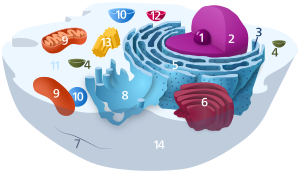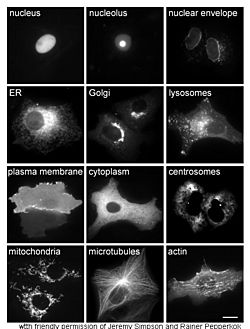Cytoplasm facts for kids
Quick facts for kids Cell biology |
|
|---|---|
| Animal cell diagram | |

Components of a typical animal cell:
|
In cell biology, the cytoplasm is everything inside a cell except for the cell nucleus. Think of it as the cell's inner world, enclosed by the cell membrane. The material inside the nucleus is called the nucleoplasm.
The cytoplasm isn't just a simple liquid. It's very organized, even though it's mostly water (about 75-80%). Its main parts are the cytosol (a gel-like substance), the organelles (which are like tiny organs with special jobs), and various cytoplasmic inclusions. The main job of the cytoplasm is to hold all these organelles in their proper places.
Contents
How the Cytoplasm Works
Scientists are still learning how all the parts of the cytoplasm work together. They want to know how things move around inside the cell while keeping its shape. The way things flow in the cytoplasm is important for many cell jobs. For example, cell signaling (how cells communicate) depends on how easily signaling molecules can move through the cytoplasm.
Small molecules, like calcium ions, can move easily. But larger molecules and cell parts often need help to get around. This has led to different ideas about what the cytoplasm is like.
Is it a Gel?
One idea is that the cytoplasm acts like a sol-gel. This means it can sometimes be like a watery, disorganized liquid (a "sol"). Other times, it can be like a solid, connected network (a "gel"). This theory suggests that the cytoplasm can switch between being more fluid and more solid. This might explain why different particles move at different speeds inside the cell.
Is it Like Glass?
Another idea is that the cytoplasm can act like a glass. Imagine a liquid that gets so thick it becomes solid, like glass. This theory says that when there are lots of cell parts packed together, the cytoplasm acts less like a liquid and more like a solid glass. This can freeze larger cell parts in place. However, the cell's normal activities can make the cytoplasm more fluid again, allowing things to move.
This "glass" state might be helpful for cells when they are resting or dormant. A solid cytoplasm could protect cell structures from damage. It could still let tiny proteins and other small molecules move, helping the cell restart when it becomes active again.
What's Inside the Cytoplasm?
The cytoplasm has three main parts: the cytosol, organelles, and inclusions.
The Cytosol
The cytosol is the gel-like part of the cytoplasm that isn't inside any membrane-bound organelles. It makes up about 70% of the cell's total volume. The cytosol is a complex mix of cytoskeleton fibers, dissolved molecules, and water.
It contains protein filaments like actin filaments and microtubules, which form the cell's "skeleton." You'll also find dissolved proteins and small structures like ribosomes (which make proteins) and proteasomes. The inner, more fluid part of the cytoplasm is sometimes called endoplasm.

Because of all these fibers and many dissolved large molecules (like proteins), the cytosol isn't like plain water. This "crowding" changes how the different parts of the cytosol interact with each other.
Organelles: The Cell's Tiny Organs
Organelles are like the cell's "little organs." They are usually surrounded by a membrane and have specific jobs to do. Some important organelles floating in the cytosol include:
- The mitochondria, which produce energy for the cell.
- The endoplasmic reticulum, which helps make and transport proteins and lipids.
- The Golgi apparatus, which processes and packages proteins.
- Vacuoles, which store water, nutrients, and waste.
- Lysosomes, which break down waste and old cell parts.
- In plant cells, chloroplasts, which perform photosynthesis.
Cytoplasmic Inclusions
Inclusions are small bits of insoluble substances that float in the cytosol. Different types of cells have different inclusions. For example, plants might have crystals of calcium oxalate. Cells can also store energy materials like starch, glycogen, or polyhydroxybutyrate as inclusions.
A common example is lipid droplets. These are tiny spheres made of lipids and proteins. Both simple cells (prokaryotes) and complex cells (eukaryotes) use them to store fats like fatty acids. Lipid droplets make up a lot of the volume in adipocytes (fat-storage cells), but they are found in many other cell types too.
Fun Facts About Cytoplasm
- The cytoplasm is about 80% water and is usually colorless.
- Rudolf von Kölliker first used the term 'cytoplasm' in 1863. At first, it meant all the cell's living material. Later, it came to mean everything in the cell outside the nucleus.
- Many important cell activities happen in the cytoplasm. These include many metabolic pathways, like glycolysis (breaking down sugar for energy) and parts of photosynthesis (in plant cells). Processes like cell division also involve the cytoplasm.
See also
 In Spanish: Citoplasma para niños
In Spanish: Citoplasma para niños

